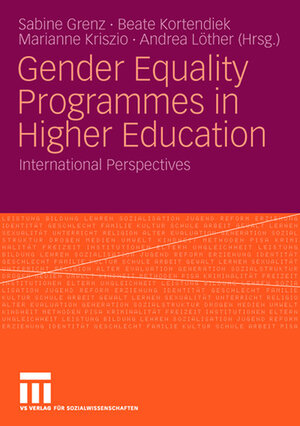
×
![Buchcover ISBN 9783531912189]()
"[...] die hier in sehr anschaulicher Form vorgestellten Studien und Programme [tragen] zu einem schrittweisen Bewusstseinswandel all derer bei, die über Qualität in Forschung und Lehre entscheiden. Überdies liefern die Autorinnen und Autoren weiteres wichtiges Material für eine produktive Auseinandersetzung auf dem Weg zur 'Excellence under conditions of fairness' [...]." www. zpol. de (Zeitschrift für Politikwissenschaft), 20.01.2009
Gender Equality Programmes in Higher Education
International Perspectives
herausgegeben von Sabine Grenz, Beate Kortendiek, Marianne Kriszio und Andrea LötherGender equality has been on the agenda of national policies of higher education within and outside the European Union (EU) for the last twenty years. In some European countries, this process was initiated early on and has brought about remarkable results, while in others progress has been slower. Different countries and institutions have focussed on different strategies for raising awareness about the discrimination of women and for increasing the number of women in aca- mia, particularly in leadership positions. Previous research on gender equality in higher education has produced many case studies about programmes at institutions of higher education in Europe and elsewhere. Different actors like the European Commission and - tional organisations have also furnished reports about national policies. Building on this material, it is now time to analyse under what conditions equality p- grammes are successful. For a deeper understanding of the mechanisms of and barriers to gender equality in higher education, we also need studies that focus on the development of gender equality policies in different countries, as well as on conditions of implementation, change of strategy, and the evaluation of - sults. Comparative studies would be another useful tool for understanding the development and success of gender equality programmes.



